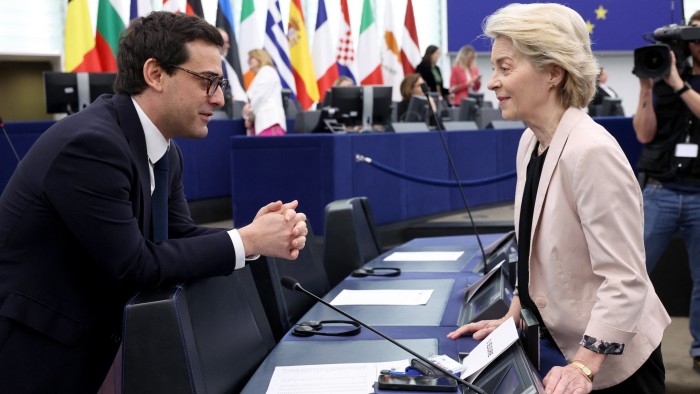This article is an on-site version of our Europe Express newsletter. Premium subscribers can sign up here to get the newsletter delivered every weekday and Saturday morning. Standard subscribers can upgrade to Premium here, or explore all FT newsletters
Good morning. The EU’s new industry commissioner has told us that Brussels needs to adopt a “Europe first” attitude in response to the aggressive economic policies of Donald Trump and Xi Jinping. In his first interview since taking office, Stéphane Séjourné said the European Commission needed to act “offensively” to protect strategic sectors from the “negative music” afflicting European industry.
Today, our climate correspondent brings us more from Séjourné, and Laura and our finance correspondent reveal new EU proposals regarding frozen Russian assets.
Gridlock
What is the EU’s new industry chief going to do about Europe’s car industry? Accelerate, writes Alice Hancock.
Context: The sector has become the totem for Europe’s flagging industry and a mascot for naysayers of the bloc’s green transition, as slowing demand and cheaper imports force manufacturers to make thousands of job cuts.
The problem sits at the door of Stéphane Séjourné, the EU’s executive vice-president for prosperity and industrial strategy. The French liberal took office yesterday as the European Commission’s new mandate began.
High on his to-do list is tackling the woes of the automobile sector, which has been vocally campaigning against stricter emissions standards due to apply from next year, and a ban of new combustion engine cars from 2035.
“The automotive industry is not very different from the others,” Séjourné told the Financial Times. His diagnosis is that its troubles are enhanced by “a demand problem that is specific to the sector” and the challenge of transitioning to electric vehicles.
The commission has been adamant that it will not revoke targets already set in law. So what can Brussels do to stem the tide of job losses and production cuts?
“People are still hesitant to buy an electric car to travel long distances,” Séjourné said. Electric cars are costlier than a petrol model in most cases, and charging points far less plentiful than fuel stations.
The commission will focus on standardising batteries and building up charging infrastructure, Séjourné said.
On the demand side, it will look at “social leasing” schemes, such as a heavily subsidised one being piloted in France.
The final piece of the immediate response will be to focus on corporate fleets, used by companies such as Uber or DHL.
“The problem is that we don’t have a secondary market for electric cars. And that’s a real problem in Europe. The price is very dissuasive and there is nothing but new for sale,” the commissioner said. “So we need to create a second-hand market and the best way to create a second-hand market is to use the professional fleets, which then go into the private market.”
He added that it was not yet decided whether electrification targets for companies would be needed.
Whatever the commission chooses to do, it will have to find favour with the European parliament’s right wing, which has become more and more vocal about reversing the 2035 petrol car ban and letting carmakers off any fines they might incur.
Chart du jour: Ebbing
The Caspian Sea is about to reach its lowest water level ever recorded, as climate change is causing lasting damage.
Defrosting
EU countries could unfreeze certain Russian assets held in Europe, in order to reflect Moscow’s retaliatory seizure of western assets, write Paola Tamma and Laura Dubois.
Context: EU sanctions have frozen more than €70bn belonging to Russian investors at Euroclear, Europe’s largest central securities depository. But Moscow also holds around €25bn belonging to Euroclear’s clients, and has started chipping away at these assets to compensate Russian investors.
Due to a decree passed last year, Russian investors whose assets are immobilised in the EU can claim compensation from Euroclear’s assets held at Russia’s National Settlement Depository, its Russian equivalent. This has already led to more than €4bn in cash being paid out from Euroclear’s account at the NSD, a sum that’s likely to rise further.
European officials see this as a circumvention of the sanctions, but the scheme also poses difficulties for Euroclear.
While the cash is paid out on the Russian side, the Russian investors’ immobilised assets still figure on Euroclear’s balance sheet. This means Euroclear would be liable twice: to the Russian investors — even though they have already been compensated — and to its other clients, who have had their assets confiscated in Russia.
The latest EU sanctions package proposes a fix for this.
A draft seen by the FT includes a “loss recovery” clause, which would allow Euroclear to pay out cash from accounts subject to sanctions equivalent to the amount confiscated in Russia. This would then be distributed to Euroclear’s clients who have assets in Russia on a pro-rata basis.
EU representatives are due to discuss the package this week. Euroclear declined to comment.
What to watch today
-
European Commission, European parliament and EU Council presidents Ursula von der Leyen, Roberta Metsola and António Costa meet.
-
EU ministers for employment and social policy meet.
Now read these
Recommended newsletters for you
Free Lunch — Your guide to the global economic policy debate. Sign up here
The State of Britain — Peter Foster’s guide to the UK’s economy, trade and investment in a changing world. Sign up here
Are you enjoying Europe Express? Sign up here to have it delivered straight to your inbox every workday at 7am CET and on Saturdays at noon CET. Do tell us what you think, we love to hear from you: [email protected]. Keep up with the latest European stories @FT Europe



